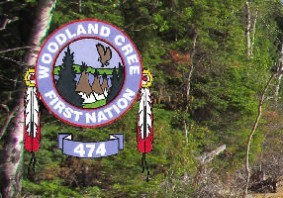The Woodland Cree First Nation (WCFN) , a signatory to Treaty 8, is located 90 km northeast of Peace River in northwestern Alberta. The First Nation has experienced seven major industry pipeline spills within and adjacent to their Traditional Lands in the past four years, including the largest oil spill in Alberta’s history in 2011, and most recently, the spill of approximately 2.7 million litres of hazardous condensate into terrestrial and aquatic ecosystems near the Nation’s reserves. WCFN leaders fear long term exposure to the toxic chemicals will cause increased health problems and will impact and disrupt the hunting, fishing, trapping, and gathering activities that feed their Nation’s members.
“We are calling upon Premier Prentice and the Alberta Energy Regulator (AER) to work jointly with our Nation to ensure our traditional lands are fully restored to pre-disturbance conditions so we can once again practice our treaty rights and livelihood. It is not enough that the land looks clean; it must actually be healthy enough to feed our membership and future generations. Right now, no one is looking at the combined effect of all of these spills on the environment, wildlife, and our health,” says Chief Isaac Laboucan-Avirom.
All of the spills are located within WCFN’s traditional territory, where WCFN members actively hunt, fish, trap, and gather berries and medicinal plants. According to impact assessment reports, the chemicals released in these multiple spills include known carcinogens and volatile hydrocarbons which are dangerous to human and wildlife health.
“WCFN is asking the Premier why are these spills happening? What are the impacts to our land, water, fish and wildlife, plants? More importantly, is it safe to eat the animals and drink the water? What happens when all of these chemicals interact together in our environment or in our water? How do all these toxic substances impact our livelihood and health?” ask Chief and Council.
AER and Alberta Environment standards for reclamation vary depending upon the use of the lands impacted. Regulations do not account for human use of wilderness areas for food and water consumption.
“We need to fully understand the current and long term cumulative impacts from the combined pipeline leakages to our health, environment, highly valued fish, waterfowl, wildlife, and plants,” concluded the Chief.
Chief and Council are asking for funding to conduct both an independent western science and an Indigenous Knowledge impact assessment of the multiple spills, with a focus on the health and wellbeing of their members.



Be the first to comment on "Woodland Cree fear the impact of long term exposure to toxic chemicals from oil spills"